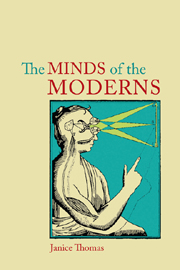Book contents
- Frontmatter
- Contents
- Acknowledgements
- Abbreviations
- Introduction
- I Descartes
- 1 Does Descartes think minds are substances?
- 2 Descartes on self-knowledge
- 3 Human consciousness and the rational soul
- 4 Mental causation
- 5 Mental representation
- II Spinoza
- III Leibniz
- IV Locke
- V Berkeley
- VI Hume
- Conclusion
- Bibliography
- Index
5 - Mental representation
from I - Descartes
- Frontmatter
- Contents
- Acknowledgements
- Abbreviations
- Introduction
- I Descartes
- 1 Does Descartes think minds are substances?
- 2 Descartes on self-knowledge
- 3 Human consciousness and the rational soul
- 4 Mental causation
- 5 Mental representation
- II Spinoza
- III Leibniz
- IV Locke
- V Berkeley
- VI Hume
- Conclusion
- Bibliography
- Index
Summary
Ideas, images and resemblance
There are numerous ways for one thing to represent another thing. Paintings and portraits can represent their subject matter. Maps represent geographical areas and features. Graphs can represent economic, political, criminal, medical, virtually any kinds of trends or features. A red light means stop or danger. Diagrams and blueprints represent methods of assembly and details of construction. More obvious than any of the things mentioned so far, words – bits of language – stand for things and states of affairs.
But if all these things are rightly regarded as representational they are also alike in having what is sometimes called “derived intentionality or aboutness”. An object is not a map unless it has been made with the intention of representing a particular region. A graph exhibits what it does because someone draws it, meaning it to illustrate just that trend or statistic. Words denote the situations and objects they do because speakers have a convention that those words have their prescribed senses. The listed items represent their objects because of the intentions, decisions or conventions of beings with minds. It is only the mental states of thinkers that are generally taken to have underived or “original” intentionality.
The original intentionality or representational character of the mental, it is generally also agreed, is the source of the aboutness that thinkers are able to bestow on their words and the other significant objects they create and use.
- Type
- Chapter
- Information
- The Minds of the ModernsRationalism, Empiricism and Philosophy of Mind, pp. 51 - 60Publisher: Acumen PublishingPrint publication year: 2009

